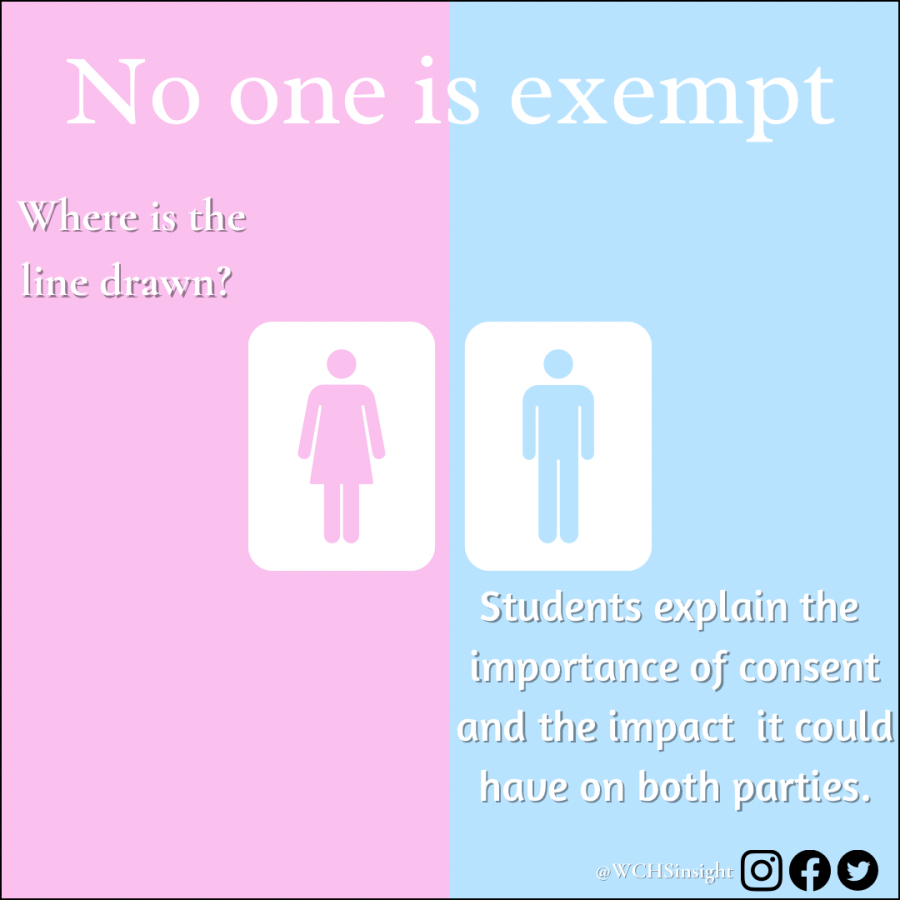Opinion: No one is exempt
January 24, 2023
Trigger warning: Contents contain topics about sexual assault.
As generations face changing social standards, one specific issue that has polarized many adolescents is the lack of consent within peers. While younger generations become more engrossed with gossip and social media, this has caused a serious gap in understanding privacy and boundaries.
Consent is defined as permission for something to happen. Although consent has recently been taught more in schools, this does not equate to it being equally respected. The environment of high school presents a childish disrespect to peers. Conforming to the crowd of gossiping and rumors, pulling down other peers, is all brushed off as simple drama. Consent to recording one another, sharing videos and images without the consent of one another, unwanted physical contact, all of these factors in combination with rumors lead up to an emotional and physical distress like no other.
Viewing students as entertainment versus human beings has caused many to question the direction our generation is heading for. As many students of all genders have experienced this violation and social exposure, this poses the question of ethics from both sides of women and men; what are they taught about consent?
Female Perspective
For many years, it has been cemented in teenage girls’ minds that their opinions have little to no meaning. Teenage girls are constantly under social pressure from peers to act in certain ways such as oversexualization, obligations to resolve conflict with violence, or to diminish the importance of their words.
The generational voice of consent for women has significantly improved over the years. Throughout the years, there has been growing support for women and young girls who have experienced a violation of their privacy. According to the San Diego State University News Center, recognizing the problem of unconsented actions requires engagement and understanding.
On campus club “Period” advocates for women’s empowerment and the ending of period poverty. Topics such as consent are discussed under the regime. President Amy Dang stated the importance of understanding consent.
“Feeling pressured into doing something you don’t want to do, whether it’s explicit or implicit pressure, is not real consenting. Healthy relationships and interactions are built on a basis of mutual understanding, so you should not feel uncomfortable and pressured,” said Dang.
A common issue that disrupts the importance of consent is the disrespect peers have for each other. Numerous cases of unconsented conflicts go unbelieved and covered by gossip and rumor in any time of day. Judgment instead of support spreads easily, and it’s a question to ask, how can we hope women will believe us when we do not believe them?
“People should be aware that they have the right to have their boundaries respected, and that they have to respect others’ boundaries,” continued Dang.
Dang elaborates on the importance of consent towards everyone and how impactful boundaries should be understood.
“Additionally, consent goes both ways—there’s a common belief that men can’t be raped or sexually harassed because they must always enjoy sex, but this is false and harmful. People’s boundaries should always be respected, regardless of gender, situation, or reason,” continued Dang.
Throughout the obstacles that present day generation faces, men also have to adjust to social changes.
Male Perspective
Toxic masculinity has affected the image of men for years. Usually men are given expectations on how to act, whether it is hiding certain feelings, being put-together, or being told to ”man up”.
It is believed that men don’t experience grooming or sexual assault and are not believed when they speak up because they are are considered “more dominant”.
It is usually presumed that men do not experience sexual harassment, however according to statistics from the National Sexual Violence Resources Center (NSVRC) 43% or 1 in 4 men are sexually assaulted to some degree whether during childhood or adulthood.
Teenage boys usually don’t report sexual assault because it could make them feel embarrassed or emasculated.
According to the Rape Abuse & Incest National Network (RAINN), 1 in 6 women and 1 in 10 men experience sexual assault, meaning statistics are fairy high for both genders, including men.
It is important to educate teens on the importance of consent and to understand that consent can be withdrawn at any time. Vice President of Period club Gavin Flores spoke about what he believes about consent.
¨I feel consent is important because it’s more than just yes or no. Consent in terms of romantic experiences can change the way you view people and can really change the way a person receives affection,” Flores said.
Flores then went on to talk about who he thinks the importance of consent should be educated towards.
¨I think everyone needs to have at least some kind of knowledge on consent, I don’t think there should be anyone out there that doesn’t care about consent because nobody would want an uncomfortable situation inflicted upon them,¨ continued Flores.
No one is left out to consent, no matter the gender, people must retain responsibility for the safety and comfort of others.
Conclusion
The importance of consent expands further beyond and before high school. Sexual harassment and consent go further than just high school. This is an issue in many real world environments such as jobs/workplaces, parties, and even the military that affect all genders.
AFJROTC Vice Core commander Alisa Acuña stated her knowledge on consent and the effects of it in professional environments.
“Something that isn’t talked about a lot is women and men getting sexually assaulted, harassed, or raped in the military. This is usually over due to a lack of consent. I wish that it was taken more seriously because most people sweep it under the rug and will not necessarily believe the victims,” said Acuña.
The understanding of consent continues to affect millions in their daily lives, expanding from high school environments to professional ones.
Asking for consent matters in all forms, whether it comes from video recording privacy to physical altercations, your feelings always matter. Never feel ashamed to speak up and to use your voice to encourage others to do the same.



